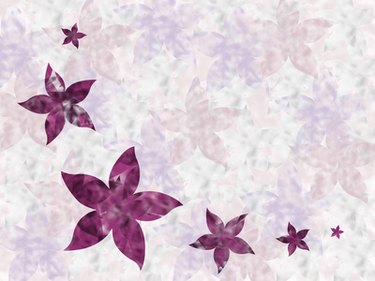
Most artwork contains six elements of design. Artists use these elements as a way to produce different styles, techniques and forms of arts. The elements are often organized in different ways to produce different results. The organization of the elements is often referred to as "The Principles of Design."
Line
Video of the Day
A line is the most basic design element. It is made when there is a mark that continues on the surface of the artwork. A line can vary greatly in its appearance, such as its length, texture, curve, width or direction.
Video of the Day
Shape
A shape is defined as being a two-dimensional object, such as a circle or triangle that encloses a space within the artwork. It can be geometric or free-form and is often a focal point or distinct point in the artwork.
Color
Color is given to an object when light hits it and then reflects back to our eyes. This element of design is characterized by three elements: hue, intensity and value. The hue is the name or label of the color, such as green, orange or red. The intensity is the strength of the hue, such as a bright orange. The value of the color is the lightness or darkness associated with it.
Form
A form is similar to a shape, but is three-dimensional. A form also closes a space and can be free-form or geometrical. Often times, a form is focal point to artwork as well.
Space
Shapes and forms make up space in artwork. A positive form is where the forms and shapes exist, while a negative space is where there are no shapes or forms.
Texture
Texture refers to the look and the feel of any object within artwork. It can create a smooth or rough look in the artwork.